more>>More News
- Year of the Rooster hosts two versions of 'Start o...
- Spring Festival in China

- Culture Insider: A compact history of women's powd...
- Traditional Chinese Medicine(TCM)
- The 24 Solar Terms
- THE GREAT WALL
- Mid-Autumn Day
- Chinese Ancient Garment
- DOUBLE SEVENTH FESTIVAL
- Chinese traditional dramas hit the big screen in H...

Traditional Festivals in China--Spring Festival
By admin on 2015-03-06
Spring Festival, that is, the lunar New Year, is commonly known as celebrating the Chinese New Year. It begins from the Kitchen God worshipping in December 23 to Lantern Festival in January 15. Some places’ celebration lasts longer, starting from December 8 to the February 2. However, when it comes to New Year’s Eve and the first day of the lunar year, the celebration arrives to the peak. Spring Festival is the most important, ceremonious, time-honored and enjoyable traditional holiday all around China.
Practices
1 Red envelopes
Red envelopes are passed out during the Chinese New Year's celebrations, from married couples or the elderly to unmarried juniors. It is also common for adults or young couples to give red packets to children.
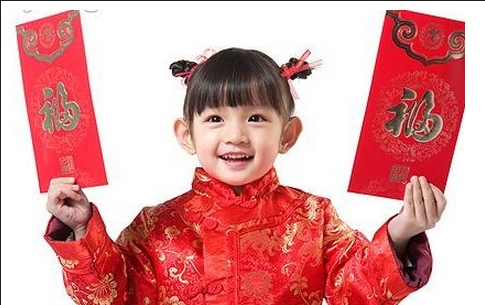
2Fireworks
Bamboo stems filled with gunpowder that were burnt to create small explosions were once used in ancient China to drive away evil spirits. In modern times, this method has eventually evolved into the use of firecrackers during the festive season. Firecrackers are usually strung on a long fused string so it can be hung down. Each firecracker is rolled up in red papers, as red is auspicious, with gunpowder in its core. Once ignited, the firecracker lets out a loud popping noise and, as they are usually strung together by the hundreds, the firecrackers are known for their deafening explosions that are thought to scare away evil spirits. The burning of firecrackers also signifies a joyful time of year and has become an integral aspect of Chinese New Year celebrations.
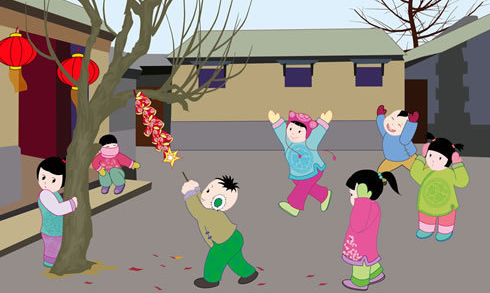
3 Hand-written Chinese New Year's poetry pasted on the sides of doors leading to people's homes, (dui lian)
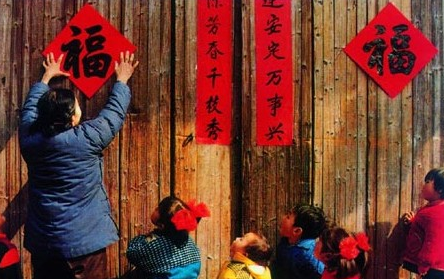
4 Prayers and simple offerings to the gods.
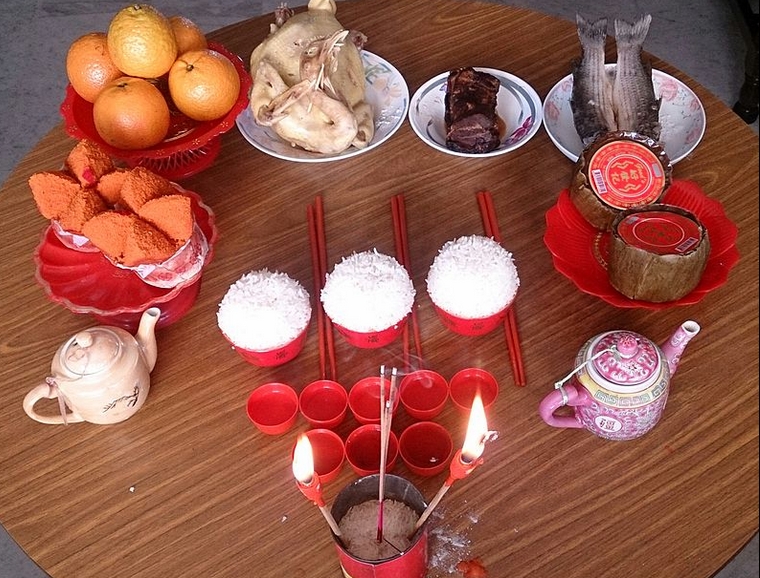
5 visiting friends and relatives
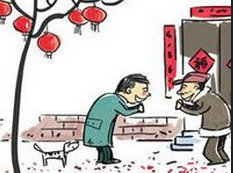
Traditional food
A reunion dinner, named as "Nian Ye Fan", is held on New Year's Eve during which family members gather for celebration. The venue will usually be in or near the home of the most senior member of the family. The New Year's Eve dinner is very large and sumptuous and traditionally includes dishes of meat (namely, pork and chicken) and fish. Most reunion dinners also feature a communal hot pot as it is believed to signify the coming together of the family members for the meal. Most reunion dinners (particularly in the Southern regions) also prominently feature specialty meats (e.g. wax-cured meats like duck and Chinese sausage) and seafood (e.g. lobster and abalone) that are usually reserved for this and other special occasions during the remainder of the year. In most areas, fish (traditional Chinese: 魚; simplified Chinese: 鱼; pinyin: yú) is included, but not eaten completely (and the remainder is stored overnight), as the Chinese phrase "may there be surpluses every year" (traditional Chinese: 年年有餘; simplified Chinese: 年年有余; pinyin: niánnián yǒu yú) sounds the same as "let there be fish every year." Eight individual dishes are served to reflect the belief of good fortune associated with the number. If in the previous year a death was experienced in the family, seven dishes are served.
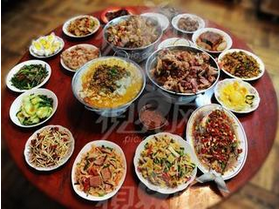
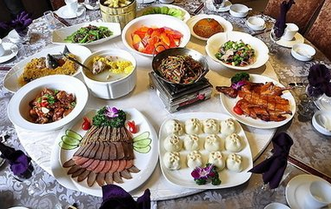
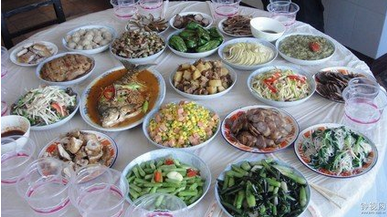
Greetings
新年快乐 Xīn nián kuài lè - Happy New Year
过年好 Guò nián Hǎo - Happy New Year
恭喜发财 Gōng xǐ fā cái - Congratulations and be prosperous
金玉滿堂 Jīnyùmǎntáng - "May your wealth [gold and jade] come to fill a hall"
大展鴻圖 Dàzhǎnhóngtú - "May you realize your ambitions"
迎春接福 Yíngchúnjiēfú - "Greet the New Year and encounter happiness"
萬事如意 Wànshìrúyì - "May all your wishes be fulfilled"
吉慶有餘 Jíqìngyǒuyú - "May your happiness be without limit"
竹報平安 Zhúbàopíng'ān - "May you hear [in a letter] that all is well"
一本萬利 Yīběnwànlì - "May a small investment bring ten-thousandfold profits"
福壽雙全 Fúshòushuāngquán - "May your happiness and longevity be complete"
招財進寶 Zhāocáijìnbǎo - "When wealth is acquired, precious objects follow"
- Contact Us
-
Tel:
0086-571-88165708
0086-571-88165512E-mail:
admission@cuecc.com
- About Us
- Who We Are What we do Why CUECC How to Apply
- Address
- Study in China TESOL in China
Hangzhou Jiaoyu Science and Technology Co.LTD.
Copyright 2003-2024, All rights reserved




 Chinese
Chinese
 English
English
 Korean
Korean
 Japanese
Japanese
 French
French
 Russian
Russian
 Vietnamese
Vietnamese
